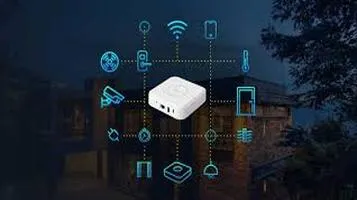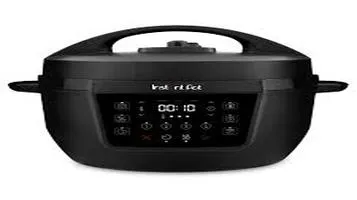Comprehensive Review of Smart Home Hubs: Bridging Technology and Convenience
Smart Home Hubs serve as the central control points for managing various connected devices within a smart home ecosystem. These hubs integrate and streamline communication among devices from different manufacturers, allowing users to control lights, thermostats, security systems, and more through a single interface. Equipped with wireless communication protocols like Zigbee, Z-Wave, Wi-Fi, and Bluetooth, smart home hubs enable seamless automation and remote access via smartphones or voice assistants. They enhance convenience and efficiency by enabling routines and scenes—predefined settings that activate multiple devices simultaneously. As the nucleus of smart home networks, these hubs facilitate interoperability and ensure a cohesive, user-friendly experience, making it easier to manage and optimize a modern, connected living environment.

In an era where technology seamlessly integrates into the fabric of our daily lives, smart home hubs have emerged as pivotal players in the smart home ecosystem. They serve as central command units, orchestrating various smart devices to create a cohesive, automated environment. This review delves into the intricacies of smart home hubs, evaluating their functionalities, benefits, and potential drawbacks.
Understanding Smart Home Hubs
At their core, smart home hubs are devices that connect and control multiple smart devices within a home. They act as intermediaries, enabling communication between different devices, regardless of their brand or protocol. This interoperability is crucial in creating a unified smart home experience, as it allows users to control lighting, thermostats, security systems, and more from a single interface.
Leading Smart Home Hubs in the Market
1. Amazon Echo (with Alexa)
Amazon’s Echo line, powered by the Alexa voice assistant, is arguably one of the most popular smart home hubs. The Echo devices support a wide range of smart home products and offer robust voice control capabilities. Alexa’s compatibility extends to thousands of smart home devices, making it a versatile choice for users seeking comprehensive home automation.
2. Google Nest Hub
Google Nest Hub, integrated with Google Assistant, offers a visually rich interface combined with powerful voice control. The device’s screen provides a convenient way to view security camera feeds, control smart devices, and access information. Google’s ecosystem, while slightly less extensive than Amazon’s, still supports a vast array of smart products.
3. Apple HomePod (with Siri)
For those deeply embedded in the Apple ecosystem, the HomePod and HomePod Mini, powered by Siri, offer seamless integration with Apple’s HomeKit platform. The HomePod’s superior audio quality sets it apart, making it not just a smart hub but also a high-fidelity speaker. However, its compatibility is somewhat limited compared to Alexa or Google Assistant.
4. Samsung SmartThings Hub
The SmartThings Hub by Samsung distinguishes itself with its broad compatibility, supporting Zigbee, Z-Wave, and Wi-Fi devices. This extensive compatibility makes it an excellent choice for users who already own a variety of smart devices across different protocols. The SmartThings app provides a user-friendly interface for automating and controlling devices.
Key Benefits of Smart Home Hubs
1. Unified Control
The primary advantage of smart home hubs is the ability to control multiple devices from a single interface. This unification simplifies the user experience, allowing for easier management of smart home ecosystems.
2. Automation and Scenes
Smart home hubs enable the creation of automation routines and scenes. For instance, a “Good Morning” scene could simultaneously adjust the thermostat, turn on lights, and start the coffee maker. These automations enhance convenience and can lead to energy savings.
3. Voice Control
Voice assistants like Alexa, Google Assistant, and Siri provide hands-free control of smart home devices. This feature is particularly beneficial for accessibility, allowing users with mobility issues to control their environment effortlessly.
4. Enhanced Security
Smart home hubs often integrate with security systems, providing real-time alerts and remote monitoring. This integration enhances home security, giving users peace of mind whether they are at home or away.
Potential Drawbacks
1. Privacy Concerns
The integration of voice assistants and always-on microphones raises privacy concerns. Users must trust that their data and conversations are secure and not being misused. Companies have made strides in addressing these issues, but they remain a point of contention for some.
2. Compatibility Issues
While many hubs boast extensive compatibility, there can still be issues with specific devices or brands. Users may find that not all their existing smart devices are supported, which can limit the hub’s effectiveness.
3. Complexity and Setup
Setting up a smart home hub and integrating multiple devices can be complex, particularly for those unfamiliar with smart technology. While manufacturers strive to simplify the process, a certain level of technical acumen is often required.
4. Cost
Investing in a smart home hub and compatible devices can be expensive. While the long-term benefits often justify the cost, the initial investment can be a barrier for some users.
Conclusion
Smart home hubs represent a significant leap forward in home automation, offering unparalleled convenience, control, and integration. Leading options like Amazon Echo, Google Nest Hub, Apple HomePod, and Samsung SmartThings Hub each bring unique strengths to the table, catering to different user needs and preferences.
While there are potential drawbacks, such as privacy concerns and compatibility issues, the benefits of unified control, automation, voice control, and enhanced security largely outweigh them. As technology continues to evolve, smart home hubs are likely to become even more integral to our daily lives, making our homes smarter, more efficient, and more connected than ever before.
In conclusion, investing in a smart home hub can transform your living space into a futuristic environment, providing both practical benefits and a touch of modern luxury. Whether you are an early adopter or a cautious consumer, the convenience and innovation offered by smart home hubs make them a worthwhile consideration for any household.






